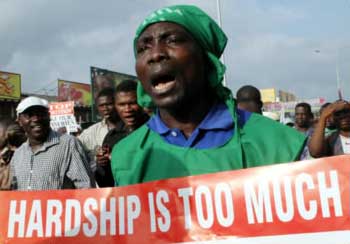When Nigeria’s President Muhammadu Buhari told a visiting UN delegation hat “suddenly we are a poor country”, people knew what he meant.
While he was speaking, local media was awash with reports of more economic woes – four blue-chip companies (Nestle Nigeria, Nigerian Breweries, Dangote Cement and Lafarge Africa) recording profit losses of 51.8bn naira ($162m; £125m) in the first half of this year and South Africa taking over from Nigeria as biggest economy.
Undoubtedly, Nigeria is now going through what some analysts describe as the worst economic downturn in decades. The economy depends on revenue from the sale of crude oil. When oil prices fell from more than $100 a barrel to about $40, the naira lost more than a third of its value.
Nigerians are feeling the effects. Many civil servants have not been paid for at least a year and others live with the fear that their monthly salaries will also stop.
“People now buy only food,” Economist Jibrin Rabi’u.
While the government talks of measures to cushion the effects of poverty, people are increasingly sharing tips on how to survive and and are questioning how they are being governed.
There are stories of families going for days without food, of husbands absconding because they are unable to meet the basic needs of their families, and there have even been reports of a few young men taking their own lives after their efforts to earn a living ended in failure.

